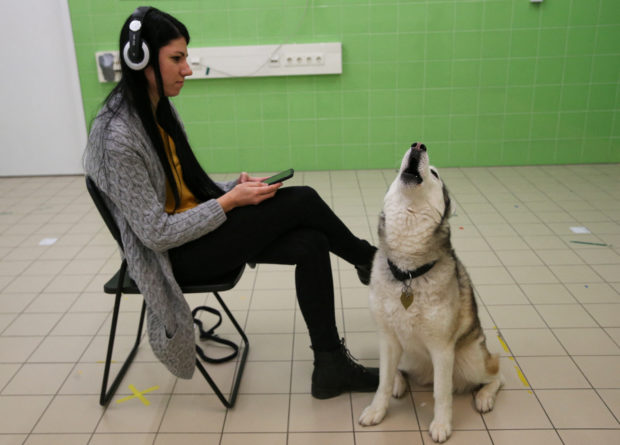Call of the wild? Hungarian research explores why your dog is prone to howling

FILE PHOTO: Bizsu, an 8-year-old Siberian Husky, howls next to her owner, Fanni Lehoczki, researcher during a test trying to find why specific dog breeds are more to prone howl and whether it is linked to their genetic closeness to wolves, at the Ethology Department of the Eotvos Lorand University in Budapest, Hungary, February 7, 2023. REUTERS/Bernadett Szabo
BUDAPEST — When Hungarian animal behaviorist Fanni Lehoczki noticed the frequent howls of her Siberian husky “Bizsu” didn’t always provoke other dogs into a wolf-like response, it prompted the question – why are certain dogs more prone to howling?
Researchers at Budapest’s Eotvos Lorand University where Lehoczki works examined whether certain dog breeds are more prone to howling and if this had anything to do with their genetic closeness to wolves.
Lehoczki and her team examined how a dog’s breed, age and sex impacted its reaction to howling, by testing 68 purebred family dogs by playing three-minute recordings of wolf howls and observing their reactions.
The dogs in the experiment belonged to 28 different breeds ranging from ancient breeds such Shiba inu, Siberian husky, Alaskan malamute, and Pekingese, to bull terriers and boxers.
“The main finding was that … those breeds which are genetically closer to wolves are more prone to respond with howling, and they also show more stress signals than dogs which are less related to wolves,” Lehoczki said, noting this was true only for dogs older than five years.
Article continues after this advertisementAmong younger dogs there was no difference between the breeds, so researchers will examine this aspect further.
Article continues after this advertisementOlder dogs of more ancient breeds responded with longer howls and showed more stress-related behaviours too, while more modern breeds seemed to react with barking.
The research also concluded that breeds which tend to howl more also show more stress-related behaviour such as yawning, shaking their body, licking their mouth or scratching the body.
The study is the first specifically investigating howling in domestic dogs. “Domestication and selective breeding by humans fundamentally changed dogs’ vocal repertoire and both the perception and production of howling in dogs,” it concluded.